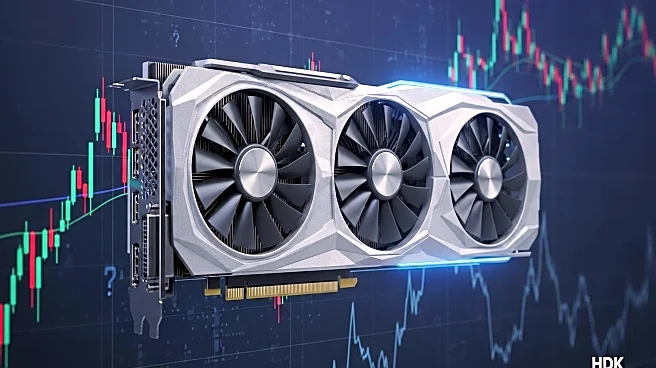What's Happening?
Nvidia, a prominent player in artificial intelligence technology, reported robust financial results for the second quarter of fiscal 2026, with revenue increasing by 6% sequentially and 56% year-over-year, reaching $46.7 billion. Despite these strong earnings, Nvidia's stock price fell by 4% following the announcement. The decline is attributed to investor concerns about the broader AI market and potential bubble risks. Additionally, the semiconductor sector, including Nvidia, experienced a sell-off, influenced by broader market concerns and economic data. The July PCE inflation report confirmed expectations for a rate cut in September, adding to the market's cautious outlook.
Why It's Important?
The decline in Nvidia's stock price, despite strong earnings, highlights investor apprehension about the sustainability of growth in the AI sector. This situation underscores the broader market risks associated with AI adoption, as a recent MIT survey revealed that 95% of companies experimenting with AI are not seeing revenue from it. The uncertainty surrounding AI's financial impact poses challenges for stakeholders in the technology and semiconductor industries. Furthermore, the July PCE inflation report indicates ongoing economic uncertainty, which could affect consumer spending and market sentiment, impacting various sectors including technology and finance.
What's Next?
As the market looks ahead to the earnings season and further economic data, stakeholders will closely monitor developments in the AI sector and broader economic indicators. Potential reactions from investors and companies may include strategic adjustments to mitigate risks associated with AI adoption and market volatility. The anticipated rate cut in September could influence market dynamics, affecting investment strategies and economic forecasts.
Beyond the Headlines
The situation with Nvidia and the broader semiconductor sector may prompt discussions on the ethical and strategic implications of AI technology. As companies navigate the challenges of AI adoption, considerations around data privacy, ethical AI use, and long-term sustainability could become more prominent. Additionally, the economic impact of President Trump's tariffs, as indicated by the inflation report, may continue to influence U.S. economic policy and international trade relations.










